FIDE World Cup semifinals open with hard-fought draws
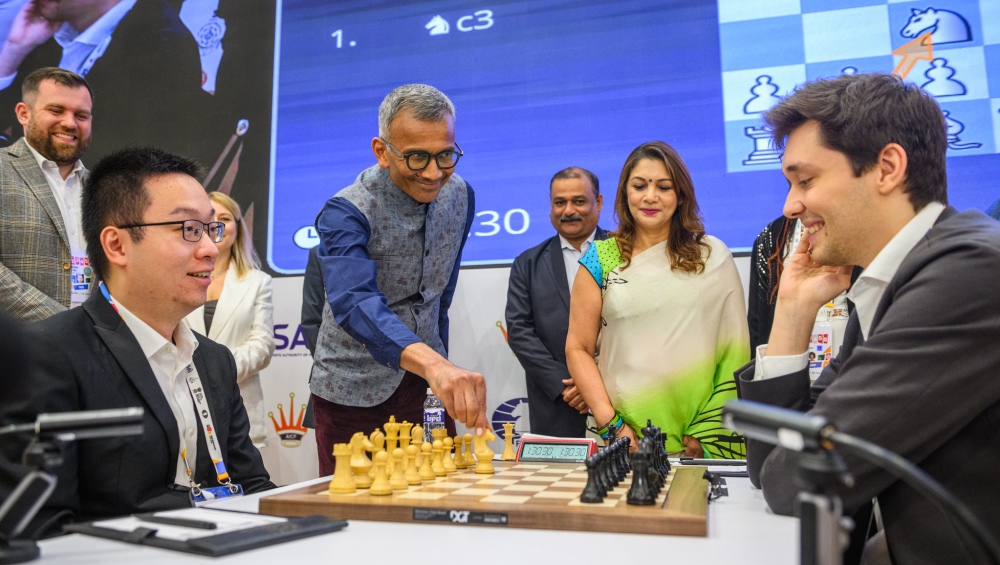
After a quiet rest day yesterday, the players returned to the hall where they have been competing for the last twenty days. A new stage setup elevated the boards, symbolic and fitting for the spectacle that the final rounds of the FIDE World Cup promise to bring. Today marked game one of the semifinals, and although both matches, Wei Yi vs Andrey Esipenko and Nodirbek Yakubboev vs Javokhir Sindarov, ended in draws, they were anything but uneventful. Deep preparation, opening surprises, time pressure and several only-move moments defined the day. Grandmaster Wei Yi, as has become routine, was the first to arrive, followed shortly by his opponent Grandmaster Andrey Esipenko. With a few minutes to spare before the round began, both sat quietly at the board, focused and still. Grandmaster Nodirbek Yakubboev arrived next, carrying his usual five bottles of water. Just before the clocks were started, the ceremonial first move took place, and moments later a slightly flustered and narrowly on-time Javokhir Sindarov entered the hall and took his seat opposite his Uzbek teammate. Today’s first move on the board between Wei Yi and Esipenko was made by Mr. Anup Shah, Managing Director of Resort Rio Goa, and Mrs. Alpa Shah, Director of Resort Rio Goa, two people who have led the wonderful hospitality provided to us throughout the last month. This month of remarkable chess has brought us to these intense final stages. As Grandmaster Fabiano Caruana, the first qualifier to the 2026 FIDE Candidates, stated online, the World Cup is an incredibly difficult tournament and regardless of how well one performs, only three participants leave truly happy: the three Candidates qualifiers. Watching the field shrink after every round has been bittersweet. With players departing every few days, the dining hall has grown quieter. And knowing that one of these four semifinalists, after fighting so hard to reach this point, will soon join the list of 202 eliminated players feels equally, if not more, bittersweet. Still, this is the nature of the event. Success here demands skill, stamina and a measure of luck. Semifinals Game 1 results: Wei Yi ½ – ½ Andrey Esipenko Nodirbek Yakubboev ½ – ½ Javokhir Sindarov Wei Yi (2752) vs Andrey Esipenko (2693) The first surprise of the day came immediately when Esipenko met Wei Yi’s 1.e4 with 1…e6. It was the same French Defense that the Chinese number one had successfully employed in his first quarterfinal game against Arjun Erigaisi. With a rest day available for preparation, unexpected choices made strategic sense, and Esipenko’s decision became even more logical when it became clear that he was not heading into a main line, but the Rubinstein Variation: 1.e4 e6 2.d4 d5 3.Nc3 dxe4 followed by 4.Nxe4 Nd7. It was reasonable to assume that Wei Yi may not have deep practical experience here. Although initially caught off guard after anticipating what he considered a guaranteed Italian, our commentators Grandmasters Peter Leko and Jan Gustafsson quickly agreed that this was a clever and well-timed choice by Black. Wei Yi appeared taken aback by the opening and took his time before committing to a structure and a plan. Esipenko essentially won the opening phase, reaching a slightly better position with two bishops and holding a significant time advantage. Wei Yi, on the other hand, found himself struggling to find chances for activity while also feeling the growing pressure of the clock. Then, suddenly, everything turned. A critical nuance required Black to play 27…Qf5 to remove White’s queen from the center before taking the pawn on h5. That line would have left White with an inferior but holdable position – requiring accuracy. Instead, Esipenko played the immediate 27…Qxh5, and after several minutes of calculation, Wei Yi unleashed the stunning 28.Bxa6! The bishop cannot be taken because the Black king would be exposed to decisive threats. The game continued 28…e5 29.Rd8 Rxd8 30.Rxd8 Ka7. Black attacked the bishop and threatened with 31…Bf5 but another incredible only-move followed instantly: 31.Qa4! which drew applause in the studio from Peter Leko. The game then concluded with 31…bxa6 32.Rd7+ Bxd7 33.Qxd7+ Kb6, after which the players agreed to a draw due to an unavoidable three-fold repetition. Being caught in deep preparation and finding yourself worse as White in a World Cup semifinal is never easy, but Wei Yi once again showed why he is one of the strongest performers of the event. He held his nerve, calculated with precision under extreme pressure, and found the correct moment to strike. Esipenko has previously said that luck is a necessary ingredient for success in the World Cup, and today it was his opponent who had that combination of accuracy and good fortune. Nodirbek Yakubboev (2689) vs Javokhir Sindarov (2721) Despite arriving slightly late, Sindarov seemed relaxed and confident. This was evident not only from his quick early moves and usual pacing around the hall, but also from the enthusiastic high-five he exchanged with his board neighbour Andrey Esipenko as they crossed paths in the opening minutes. Yakubboev, who arrived with the benefit of two consecutive rest days after avoiding quarterfinal tiebreaks, came armed with strong preparation against Sindarov’s Semi-Slav, the same opening they had played in their last two classical encounters. White opted for a sideline with 5.Qd3, but Black appeared completely prepared and unfazed, blitzing out correct theory as if he had predicted it. Soon, in fact, it was Yakkuboev who seemed surprised, spending 23 minutes on his 11th move despite Black having played only natural, expected moves. Despite this sharp start, nothing complicated emerged. Once both players were out of theory, the position settled, and they navigated it with great accuracy. After trading down to an even endgame, where only White could really push for something, Black offered a draw on move 30, which Yakubboev accepted. It was a calm and unsurprising beginning for two players who know each other deeply and have faced each other many times. Notably, both played with great accuracy, with respective scores of 99% and 100%. Tomorrow
A Move for Freedom and Redemption in El Salvador

A powerful and emotional moment unfolded at the Estadio Nacional Jorge “El Mágico” González, where inmates participating in El Salvador’s Plan Cero Ocio were brought out of the prison system to receive public recognition for their achievements in the 5th FIDE Intercontinental Online Chess Championship for Prisoners. The ceremony brought together leaders from FIDE, FIDE America, INDES, and the national prison authorities — a testament to the strength of this collaborative rehabilitation effort. Among the distinguished guests were: José Carrillo Pujol, President of FIDE Americas Dana Reizniece, Deputy Chair of FIDE Management Board Dinora Acevedo, INDES (National Institute of Sports of El Salvador) Samuel Diaz, Director of the Santa Ana Penitentiary Industrial Complex Erick Hernandez, Treasurer of FIDE Americas Saul Montoya, Vice President of Salvadoran Chess Federation Their presence underscored both national and international commitment to the transformative power of chess. Plan Cero Ocio: Building skills and discipline As part of Plan Cero Ocio, participants receive chess training five times a week, providing structure, focus, emotional control, and the opportunity to develop skills that support reintegration. Their dedication led to extraordinary success at the 5th Intercontinental Chess Championship for Prisoners: Gold — Women’s Team Silver — Men’s Team These achievements are supported by the tireless work of INDES’ Inclusive Sports Department which coordinates technical support with the Salvadoran Chess Federation. Special mention goes to International Master Roberto Calderin, who coached the teams for four months, guiding and advising the players daily. Regional coordination and long-term development are further strengthened by the support of FIDE Americas. Voices from the inside The most powerful words came from the participants themselves: “Chess gives me structure. Training every day helps me stay focused and calm. It’s the first time in years I feel like I’m improving at something.” “When I play, I feel free. It reminds me that my mind still belongs to me — and that I can make better decisions, one move at a time.” These reflections capture the essence of what Chess for Freedom aims to achieve: discipline, dignity, hope, and the ability to think forward — on the board and in life. FIDE’s commitment in the 2025 Year of Social Chess As part of the 2025 Year of Social Chess, FIDE is proud to stand with El Salvador in advancing programs that use chess as a bridge to education, rehabilitation, and social inclusion. This ceremony was not just about medals — it was about human transformation. Chess changes lives. And on this occasion, these players proved it on a national and global stage.
FIDE World Women’s Team Championship: Quarterfinals set with rising stars and tactical fireworks at Linares
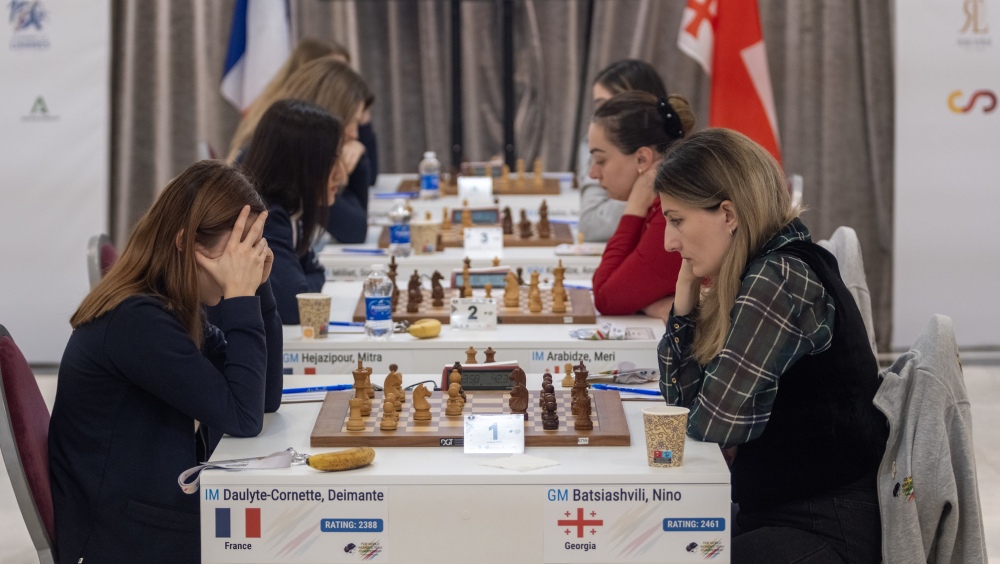
Georgia fields reserves while France scores a last-round triumph. With the qualifying rounds concluded, the quarterfinal line-up is finalized, showcasing a mix of powerhouse teams and emerging contenders. Azerbaijan, China, and other top seeds demonstrated both depth and precision, while prodigious talents like Lu Miaoyi and Ulviyya Fataliyeva reminded the chess world of their rising potential. The upcoming duels will test strategy, resilience, and nerves under pressure. Eight teams move forward, each carrying hopes, ambitions, and the scars of previous battles. Every quarterfinal match promises intense battles, where experience meets ambition, and every move could decide the fate of a championship run. Let’s look at how the afternoon unfolded in greater detail in each pool. The afternoon of chess began with Javier Ochoa de Echagüen, President of the Spanish Chess Federation and of the Ibero-American Chess Federation and FIDE Adviser, opening the round with the ceremonial gong. Pool A Azerbaijan prevailed in their crucial clash against the host nation, Spain. The final result — a convincing 3.5–0.5 — leaves no room for doubt and secured the Azeri team a spot in the quarterfinals, while simultaneously eliminating the Spaniards from the competition. One of the key victories came on board one, where IM Ulviyya Fataliyeva (2420) outplayed IM Sarasadat Khademalsharieh (2429). European U-14 and U-18 champion, Fataliyeva also won the 2024 European Women’s Individual Chess Championship. In this middlegame position, Fataliyeva enjoys more space, and her pieces are harmoniously placed for an attack. Until this moment, Khademalsharieh had defended accurately, striving to keep the position as closed as possible. However, her last move – 21…Qd7? instead of the stronger 21…0–0–0 – allowed the Azeri player to break through with a classical piece sacrifice, beginning with 22.f5! gxf5 23.Bxf5! exf5 24.e6! fxe6 25.Nxe6 The knight on e6 prevents Black from castling and threatens multiple discovered checks. Spain’s top board tried to block with 25…Be7, but after 26.Qe5! the rook on h8 came under direct fire. Khademalsharieh replied with 26…Rg8, yet 27.Qxf5 (threatening 28.Qxh5#) only intensified the pressure. Following 27…Qc6, the precise 28.Qf7+ forced immediate resignation, as 28…Kd7 29.Nc5+ Kd6 30.Bf4 leads to checkmate. A fantastic attacking masterpiece by IM Ulviyya Fataliyeva! https://www.youtube.com/watch?v=TtM3R5DTm8g In the other afternoon encounters, team FIDE completed the qualifying stage with a perfect 100% score, delivering a dominant 3.5–0.5 victory over Peru. Meanwhile, Kazakhstan produced the upset of the round, defeating team USA by the same margin and securing second place in the group. POOL A FINAL STANDINGS Pool B The match between Uzbekistan and India was fiercely contested. Although a draw would have been enough to qualify both teams, a decisive win on the fourth board by WGM Srija Seshadri secured a 2.5–1.5 victory for India and third place in the group standings. Meanwhile, China cruised past Ukraine with a convincing 3–1 score. The match highlighted IM Lu Miaoyi (2440) as a future contender for the highest honors in women’s chess. Born in 2010, Lu Miaoyi is a rising Chinese chess prodigy and one of the strongest young female players in the world. She is known for her aggressive style, rapid rating ascent, and record-setting achievements at a remarkably young age. Under severe time pressure, IM Nataliya Buksa (2400) finally cracked and played 18.Qe1? (the correct move was 18.Qe2, which would have maintained equality), allowing a neat tactical opportunity. Lu Miaoyi thought for seven minutes to calculate the lines and played 18…Nxe3! After 19.Rxe3, she followed up with 19…Qd5!, threatening mate on g2. At this point, 20.Nf3 would have fallen to 20…Qxd3, while 20.Bf1 loses to 20…Bxe3+ 21.Qxe3 Rc2!, winning immediately. Buksa chose 20.Qf1, giving up the exchange after 20…Bxe3. Although the game continued until move thirty-seven, the result was never in doubt, with Lu Miaoyi firmly in control. Already qualified in first place, Georgia decided to field their two reserve players, Kirtadze and Mgeladze, providing a well-deserved rest for the starting lineup. Despite putting up a strong fight, they went down 3–1 against France, who will leave Linares with mixed feelings – elimination from contention but a final-round victory against the group leaders. POOL B FINAL STANDINGS With these results, the quarterfinals are set. According to the regulations, each duel consists of two matches with the same time control as the qualifying stage: 45 minutes per player for the entire game, plus a 30-second increment per move starting from move 1. In the event of a drawn duel – either if each team wins one match, or both matches are drawn – board points will not be used as a tiebreaker. Instead, blitz matches will determine the winner. The first quarterfinal matches will start on November 21 at 1:30 PM local time. The action can be followed live on the FIDE YouTube Channel, featuring expert commentary by GMs Antoaneta Stefanova and Ivan Cheparinov. Official website: worldwomenteams2025.fide.com/ Written by IM Michael Rahal Photos: Raúl Martínez / Pavel Dvorkovich
FIDE announces the list of players for the 2025 World Rapid and Blitz: A stellar lineup in Doha
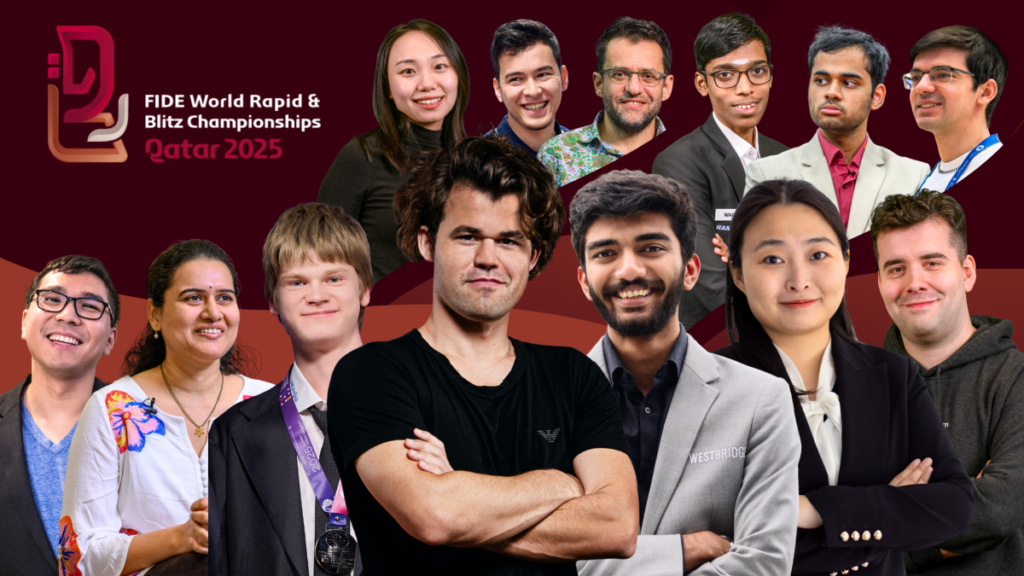
World Champion Gukesh D and Magnus Carlsen join over 360 players who have confirmed their participation in the FIDE World Rapid & Blitz Chess Championship in Doha. The event, which will take place from December 25 to 30, brings together a field featuring multiple world champions, most of the sport’s highest-rated competitors, and rising stars. A total of 233 players registered for the Blitz Open and 230 for the Rapid. After missing out on the crown in the Rapid and sharing gold in the Blitz in the previous edition in New York, Magnus Carlsen – who this year became a father – returns to the FIDE World Rapid & Blitz. He will try to unseat the 2024 World Rapid champion, Volodar Murzin, who has had strong tournament performances throughout the year. Photo: Lennart Ootes World Champion Gukesh D has also confirmed his attendance. His participation is expected to draw a lot of interest from the public. In particular, his superb result in Zagreb earlier this year indicates he will be one of the favorites in Rapid. Many seasoned elite players such as 2024 World Blitz co-champion Ian Nepomniachtchi, Fabiano Caruana, Anish Giri, Wesley So, and Levon Aronian have also confirmed their participation. Challenging them will be a new generation of contenders seeking to disrupt established hierarchies: Vincent Keymer, Arjun Erigaisi, Nodirbek Abdusattorov, Praggnanandhaa R, Yagiz Kaan Erdogmus, and Ediz Gürel to name just a few. Photo: Michal Walusza And of course, the public will be delighted to see legendary players like Alexander Grischuk, and Vasyl Ivanchuk, who actually won the World Rapid in Doha, back in 2016. FIDE Women’s Rapid and Blitz will also see the best in the world taking part. Headlined by Women’s World Champion Ju Wenjun, the competition will see 130 players, including heavyweights Zhu Jiner, Lei Tingjie, Aleksandra Goryachkina, Humpy Koneru and more. Anna Muzychuk – who won both the Women’s Rapid and Blitz in Doha in 2016 – will also be there, together with her sister, Mariya. Photo: Anna Shtourman “The lineup shows the immense strength and magnetism of the World Rapid & Blitz,” FIDE President Arkady Dvorkovich said. “We are pleased to see so many strong players in both the Open and the Women’s competition confirming they will take part. The FIDE World Rapid & Blitz is traditionally one of the most exciting and most watched chess events in the year, and we expect that tradition to continue. I’d like to thank the local organizing committee for sparing no effort in making it a great event,” Dvorkovich added. “The field is tremendously strong, and it is going to be a real chess feast. Once again, FIDE managed to gather nearly all the world’s best players, and I am looking forward to a great sportive drama, fascinated both in my FIDE capacity, and as a life-time chess fan,” says FIDE CEO Emil Sutovsky. “Doha is now the only city to host the World Rapid & Blitz Championship twice, a milestone for chess and for sports in Qatar. It reflects our deep passion for the game and our commitment to delivering excellence. We are proud to welcome the world’s greatest players back to Doha, where ambition, tradition, and the future of our sport meet,” said Mohd Al-Mudahka, President of Qatar Chess Federation. Taking place in Doha (Qatar) from December 25 to 30, the FIDE World Rapid & Blitz Chess Championship has a prize fund of over €1,000,000 spread across both the Open and the Women’s competitions. Doha last hosted the championship in 2016, when Vasyl Ivanchuk claimed the title in the Rapid section and Sergey Karjakin became the Blitz World Champion. About the event The FIDE World Rapid & Blitz Championships 2025 is taking place in Doha, Qatar from December 25 to 30, bringing together the world’s elite chess talent for a thrilling end-of-year showdown. Held at the Sports and Events Complex, Qatar University, this edition features both Open and Women’s events in Rapid and Blitz formats, with a total prize fund of over €1,000,000. Doha returns as host after nine years, underscoring Qatar’s growing stature in the chess world. The full list of registered players can be found here: Rapid Open: worldrapidandblitz2025.fide.com/participants-rapid-open/ Rapid Women: worldrapidandblitz2025.fide.com/participants-rapid-women/ Blitz Open: worldrapidandblitz2025.fide.com/participants-blitz-open/ Blitz Women: worldrapidandblitz2025.fide.com/participants-blitz-women/ For more information about the event, including media registration, please visit: https://worldrapidandblitz2025.fide.com/
2025 FIDE Women’s World Team Championship: Hou Yifan debuts as team FIDE dominates
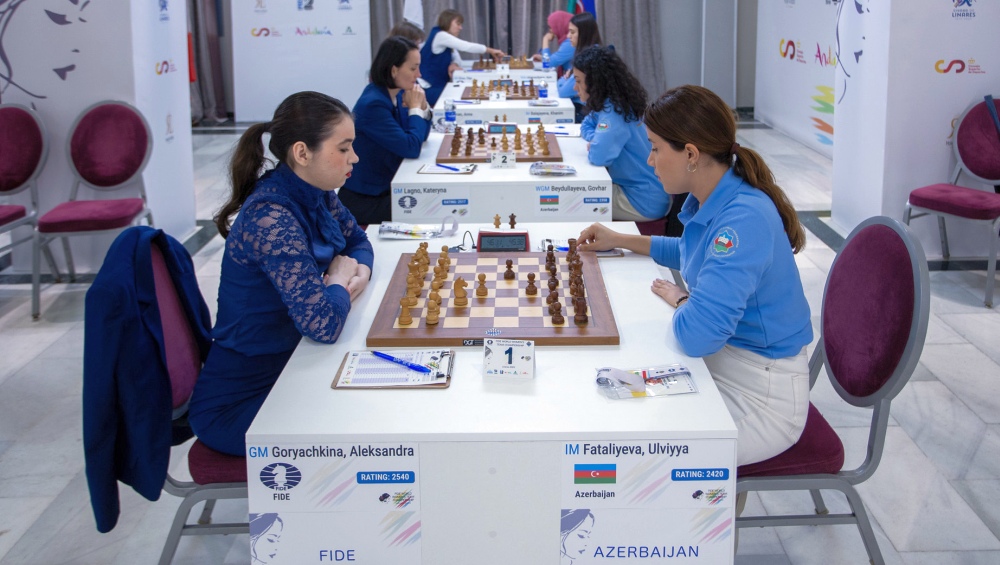
The second day of the 2025 FIDE Women’s World Team Championship in Linares delivered high drama and top-class chess across both pools. All eyes were on China’s top board, as four-time Women’s World Champion Hou Yifan made her long-awaited debut, marking it with a precise and elegant victory that immediately set the tone for Pool B. Meanwhile, Team FIDE continued to dominate Pool A, sweeping past Spain and Azerbaijan with commanding performances and edging closer to a perfect group-stage record. Beyond the headline performances, several teams found themselves embroiled in tense qualification battles. Every match carried high stakes, with narrow margins and critical tiebreak scenarios deciding which teams would advance to the quarterfinals. From the tight race for second and fourth in Pool A to the dramatic fight for the last knockout spots in Pool B, the competition was fierce, and the tension palpable. Linares has once again proven why it is one of the most exciting stages in international women’s chess. Mariola Rus Rufino, General Director of the Department of Sports Values and Systems for the Junta de Andalucía, opened the round with the ceremonial gong. Let’s look at how the afternoon unfolded in greater detail in each pool. Pool A Team FIDE continued to sweep through their opponents with emphatic victories over Spain (3.5–0.5) and Azerbaijan (3–1), securing a commanding lead at the top of Pool A. With such a margin over the chasing teams, their qualification in first place is virtually guaranteed. Barring an extremely unlikely collapse tomorrow – they face Peru, who have lost all four of their matches – Team FIDE should finish the group stage on a perfect 100% score and advance confidently to the quarterfinals. Behind them, Kazakhstan and the USA share second place with three wins and one loss each, both having been defeated only by Team FIDE. Their direct clash in the final round will determine who finishes second and who must settle for third place. The most dramatic final-round showdown, however, will decide the last qualifying spot for the quarterfinals. Spain and Azerbaijan are currently tied for fourth place – even level on game points – and will face each other in a decisive head-to-head encounter. In the event of a 2–2 draw, Sonneborn-Berger system will be the tiebreaker, meaning the results of other teams may ultimately determine who advances. Pool A- Round 5 pairings A neat tactical shot appeared on board four in the match between Spain and Team FIDE. Playing with the Black pieces, GM Olga Girya (2390) showed excellent awareness in the late middlegame against WGM Mónica Calzetta Ruiz (2194). With both players entering their final five minutes, Girya spotted a hidden tactical idea and chose the energetic advance 26…d4. Calzetta had several ways to keep the balance – for instance, 27.cxd4 cxb4 28.d5!, which should hold, or the calmer 27.Nc2 dxc3 28.Rxc3, where a draw remains the most likely outcome. Instead, Calzetta opted for 27.Ng4?, aiming to simplify quickly, but the move loses immediately to 27…Nxg4 28.hxg4 and now the powerful blow 28…dxc3!!. The rook on d7 is untouchable due to the decisive …c2 promotion idea, so White was forced to play 29.Rxc3, the simple 29…cxb4 left Girya with a completely winning position. The rest was smooth sailing for Black. Pool B Georgia have powered through Pool B with four convincing victories and have already secured first place with a round to spare. Across sixteen individual games, they remain undefeated on every board – an outstanding achievement for the team led by captain Salome Melia. China sit just behind them, having conceded a draw to India and suffering a loss to Georgia today. Even so, with five match points, they are already mathematically assured of a spot in the quarterfinals. The real drama is unfolding in the race for third and fourth place. Uzbekistan (check out an interview with the team below) and India are level on four points, while Ukraine trail with two. https://www.youtube.com/watch?v=HCMRuFtA-W0 Ukraine must defeat China tomorrow – and by as wide a margin as possible – to keep their qualification hopes alive. They also need a decisive result in the match between Uzbekistan and India; a 2–2 draw in that encounter would eliminate Ukraine regardless of their own performance. The final round promises unparalleled excitement – tension at its peak. Leading Team China, former four-time Women’s World Champion GM Hou Yifan (2620) made her Linares debut this afternoon with a clean technical masterpiece against IM Padmini Rout (2337), India’s first board. With only two minutes remaining, Padmini missed the chance to put up stubborn resistance with 44…Kg8, and instead blocked the check with her rook – 44…Rg6? Sensing the end was near, Hou Yifan calmly played 45.Rg3!, introducing several dangerous threats. After 45…Kg7, the precise 46.f4! exf4 47.Nxf4 followed, and the rook on g6 was completely trapped. The game continued 47…Rf6 48.Nh5+ Kf7 49.Nxf6, and the extra exchange was more than enough advantage for Hou Yifan to convert and score a crucial point, securing a 2–2 draw for China. Pool B – Round 5 pairings Round 5 will start on November 20 at 1:30 PM local time. The action can be followed live on the FIDE YouTube Channel, featuring expert commentary by GMs Antoaneta Stefanova and Ivan Cheparinov. Official website: worldwomenteams2025.fide.com/ Written by IM Michael Rahal Photos: Raúl Martínez / Pavel Dvorkovich
FIDE World Cup: Heartbreak for India as Arjun eliminated; Wei Yi, Esipenko, and Sindarov join Yakubboev in the semifinals
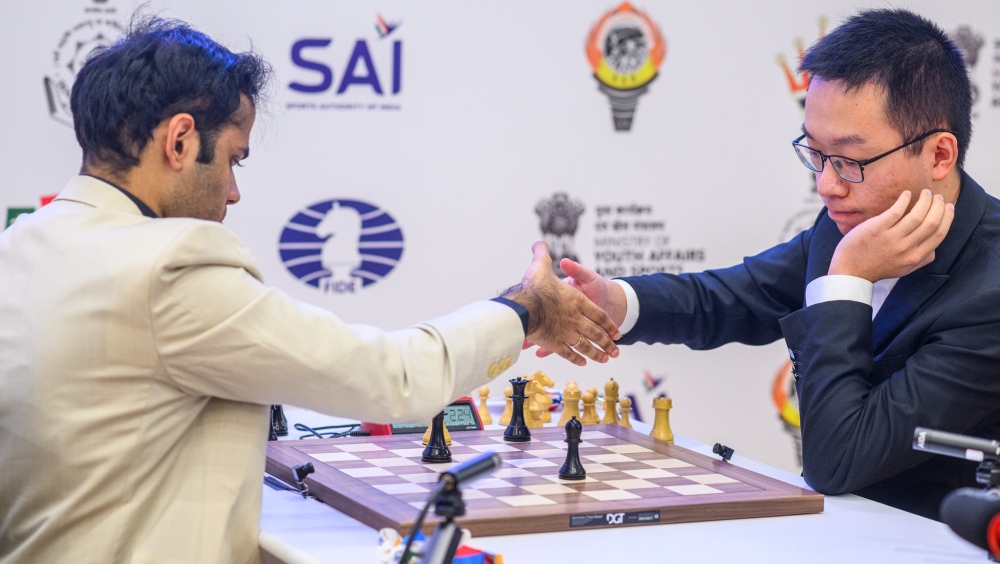
Four draws yesterday left three semi-final spots undecided and brought six players to what may be the most stressful point of the World Cup so far. With everything riding on the rapid and blitz tiebreaks, the atmosphere in the hall was tense long before the clocks started. Spectators filled the room early, aware that today would determine who would keep their Candidates hopes alive. When the day concluded, Wei Yi, Javokhir Sindarov and Andrey Esipenko all won their matches, joining Nodirbek Yakubboev who had qualified the previous day. It was also a heartbreaking afternoon for Indian fans as Arjun Erigaisi, the last remaining home player, was knocked out by Wei Yi. Before play began, the ceremonial first move was made on Board 1 of Martínez vs. Sindarov by Mr. Jayant Chaudhary, Union Minister of Skill Development and Entrepreneurship and Minister of State for Education, Government of India. With pressure high across all boards, here is how the quarterfinal tiebreak battles unfolded. QuarterfinalsTiebreak Results Arjun Erigaisi ½-1½ Wei Yi José Eduardo Martínez Alcántara 1½ -2½ Javokhir Sindarov Andrey Esipenko 3-1 Sam Shankland Wei Yi (2752) vs Arjun Erigaisi (2773)After yesterday’s classical game, in which the Chinese Grandmaster missed key moves and gave his opponent a chance to strike, Wei Yi made sure not to allow Arjun Erigaisi the same opportunity again. Arriving first to the hall today, he looked composed and focused, not a single leg shake, and ready to fight from game one. In the Steinitz Variation of the French Defense, Wei Yi, with the White pieces, launched an early kingside assault, steering the game into the kind of sharp tactical battle that suits his style and attacking instincts. The position was easy for Black to mishandle, and Arjun did exactly that after spending six minutes (a significant amount of time in rapid) selecting the worst move: Black has just played 10…f6?, allowing White to ignore the threat on the knight and play the immediate 11.Qh5!, followed by capturing on c5 and planting the queen on g6 for a direct assault on the king. Instead, Wei Yi chose 11.exf6, and after 11…Rxf6, Black remained worse, but the attack was at least more manageable. Eventually, White picked up the exchange on move 14, although, according to chess engines castling long first offered him the decisive advantage. Still, Wei Yi played with impressive accuracy up to a certain point but let his advantage slip away in time pressure. With the bishop pair, Arjun managed to simplify into equality and save the game with a draw. It was already a nerve-wracking start, and then came game two. A Petroff Defense where both players appeared well prepared led to a queenless middlegame. Though the young Indian Grandmaster seemed to be faring better than in the first encounter, he overpressed and struggled to coordinate his pieces. Indian fans may have felt relieved when the position liquidated into a stable endgame, until a critical moment unfolded and one lost tempo tilted the balance decisively: Here, Erigaisi played 41.Rf2+?, allowing 41…Bf5 42.Rb2 a6 43.d6 Ke6 44.Rd2 Bd3. The check was unnecessary; better was 41.Rb2 immediately, followed by 41…a6 42.d6 Bf5 43.Rd2. If 42…Ke6, then 43.Bb7 holds, as Black’s rook checks are harmless due to the bishop on d3. Another key moment, and Arjun’s final chance to save the game, came just a few moves later. Here Wei Yi erred with 46…Rh7? (when 46…Kd7 was stronger, as it freezes White’s pieces entirely). Arjun, playing with less than a minute, needed to find 47.Rd5, keeping the rook active and defending the pawn. Instead, he played 47.Bc6?, allowing 47…Rh3+ 48.Bf3 Bd3, leaving the White rook shut out of the game. Black collected the d-pawn and eventually created a passed pawn on the queenside. After rooks were exchanged, the resulting bishop endgame was hopeless for White. Still, they played all the way to checkmate. In the post-game interview, when asked whether he considered himself the favourite in tiebreaks (especially given his strong rapid rating of 2758 compared to Arjun’s 2708), Wei Yi was humble. He pointed out that one cannot assume superiority over Arjun in any format because he is so strong. Now the highest-rated player remaining in the event, Wei stated that he would prepare and approach the upcoming games normally, as any semifinal opponent would have to be strong to reach this stage. https://www.youtube.com/watch?v=U04jf-HzV7Q Javokhir Sindarov (2721) vs José Eduardo Martínez Alcántara (2644) The match between these two rising stars began with an unexpected twist when Martínez, with the White pieces, opened with 1.b3. Sindarov, visibly surprised and shaking his leg in his chair, took a moment before responding, entering a structure he seemed unhappy with, made worse by falling behind on the clock. A critical moment appeared when Black, already slightly worse, played the losing move 35…Rf7? Keeping the rook on the back rank with 35…Re8 would have been better. Placed awkwardly and with the e2-bishop unprotected while White threatened Nd8, Black’s the position quickly deteriorated. Following a forced sequence, Martínez emerged an exchange up. Jose Eduardo was in full control in resulting endgame, with a dominant queen and rook duo on the 7th rank. A checkmate was soon inevitable, and Sindarov resigned, putting himself in a must-win situation. In his post-match interview, Sindarov admitted he was very upset with himself after the first game and gave himself a pep talk to play well in the second, and he delivered. Game two featured a symmetrical English Opening where the early phase already favoured the Uzbek talent. Martínez played aggressively and sacrificed a pawn, creating some activity on the kingside, but Sindarov handled the pressure, converted his material advantage, and eventually wove a mating net to equalize the score. https://www.youtube.com/watch?v=Tbha_64yGZc Their first 10+10 rapid game, while drawn, was far from dull. Martínez launched a queenside pawn storm, while Sindarov countered on the kingside. Sindarov missed a chance to gain a clear advantage by shifting focus to defense instead of pushing his own attack. The game equalized once
Rising stars and surprises: Highlights from Rounds 1–2 of the FIDE Women’s World Team Championship
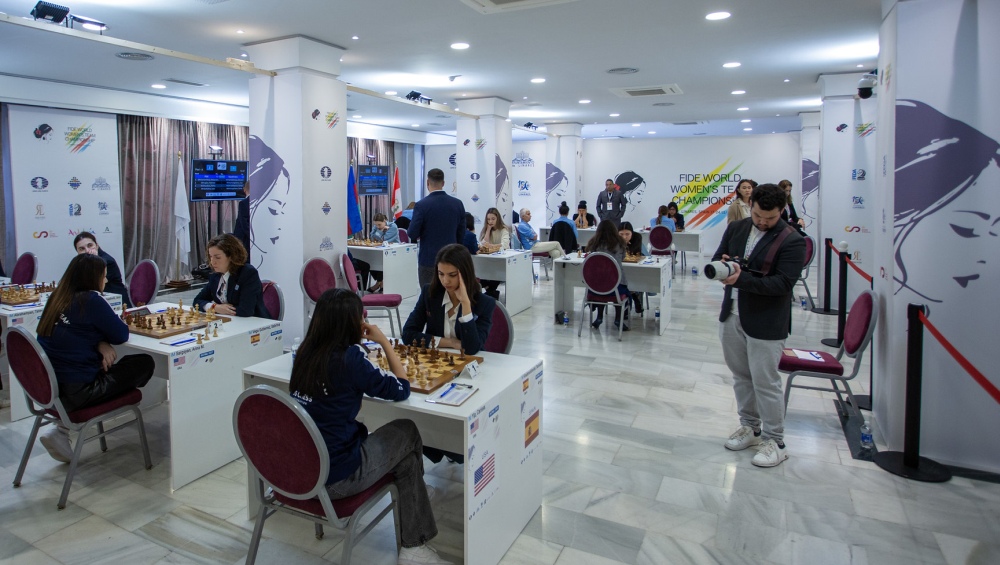
Savitha Shri B and Zhai Mo Shine with tactical brilliance while fast classical debut sparks excitement. Linares was one of the strongest chess tournaments in the world from the late 1980s through the 2000s, attracting Garry Kasparov, Anatoly Karpov, and many other elite players. At the start of each round of the Super-Tournament a large ceremonial gong was struck by a guest of honour to officially begin play. This ritual became one of Linares’s most memorable trademarks. It originated as part of the organizers’ effort to give the event a distinctive identity and elevate it to true world-class status. FIDE President Arkady Dvorkovich and FIDE Deputy President – and former five-time World Champion – Viswanathan Anand opened both rounds of the 2025 FIDE Women’s World Team Championship, reviving one of the most recognisable symbols of that earlier era. Each of the two pools in the event, A and B, features six teams that face one another in a round-robin format over five rounds. The top four teams from each pool will advance to the knockout stage, beginning with the quarterfinals. Most of today’s matches – played with the debuting 45 + 30 “fast classical” time control – were dominated by the rating favourites, though several encounters were decided by narrow 2.5–1.5 margins. After the first two rounds, Team FIDE has taken a commanding lead in Pool A, scoring convincing victories over the USA and Kazakhstan, while four teams sit just behind on 50%. Peru currently trails the group after losing both of today’s matches, against Azerbaijan and Spain, though not without putting up a resilient fight. On the other side of the hall, Pool B is led by China – playing without GM Hou Yifan – and Georgia, with India and Ukraine close behind. Great excitement is expected on day two, as rounds three and four are likely to determine the fate of several teams. One of the relative surprises of the day came in round one, where India defeated Ukraine despite being outrated by nearly 100 points. Although the current Olympic champions did not travel with their top lineup, they still field a young, cohesive, and ambitious team capable of challenging any opponent. On board three, IM Savitha Shri B (2319), playing White, controlled her game against GM Natalia Zhukova (2322) from early on, steadily building pressure on the kingside. Savitha is one of the brightest rising stars in Indian women’s chess, already progressing rapidly through high-level norms. Although White had several winning continuations, the Indian player struck decisively with 34.Rxf6!, tearing apart Black’s defensive structure. Zhukova replied with 34…Bc6+ (as 34…Qxf6 loses immediately to 35.Qxd7), but after 35.Qxc6! Rxc6 36.Rxf7, the former two-time European Women’s Champion had no choice but to resign. A clean and elegant tactical finish. Team captain GM Swayams Mishra and two of the players from the match later joined me in the interview area for a brief post-game assessment of their performance and of the new “fast classical” time control making its debut at this event. https://www.youtube.com/watch?v=d6R0GDyJOKk Meanwhile, the Chinese squad secured two convincing wins and, alongside Georgia, now leads their pool. On board four in their second-round match, WGM Zhai Mo (2384) delivered a spectacular miniature against WCM Madinabonu Khalilova (2228). Zhai Mo is a former Girls U12 World Champion and the 2018 Chinese Women’s Chess Champion. Black had just played 15…Bg7-f8, attacking the rook on d6 and attempting to provoke exchanges that might relieve the pressure. However, Zhai Mo responded aggressively with 16.Ng5!, sacrificing the exchange. After 16…Bxd6 17.exd6 Qd7 18.Ne4!, the weaknesses around the black king quickly became apparent. The decisive threat 19.Nf6+ was temporarily parried by 18…Kg7, but 19.Bb5! highlighted another vulnerability on e5. After 19…Bb7, White unleashed the final tactic: 20.Nf6!!, attacking the queen. Black resigned, as 20…Kxf6 21.Bxc6! Qxc6 22.Qe5 leads to an inevitable checkmate. A brilliant and clean finish from Zhai Mo. After the first two rounds of the tournament, the standings in both pools are as follows: Round three tomorrow at 1:30 pm promises some exciting encounters. In Pool A, the most intriguing match will be USA vs. Azerbaijan, as both teams vie for second place in the group. Close behind, Spain will aim to secure at least a draw against the formidable Team FIDE. https://youtu.be/nb8LA9s-K48?si=TA6AHrw7JvAJQ35Z In Pool B, the dramatic clash between France and Uzbekistan will provide both teams with a final chance to avoid elimination and potentially catch up with the leading teams. Round 3 begins on November 19 at 1:30 PM local time. The action can be followed live on the FIDE YouTube Channel, featuring expert commentary by GMs Antoaneta Stefanova and Ivan Cheparinov. Official website: worldwomenteams2025.fide.com/ Written by IM Michael Rahal (Linares, España) Photos: Raúl Martínez / Pavel Dvorkovich
FIDE World Cup: Three quarterfinals poised for decisive tiebreak battles
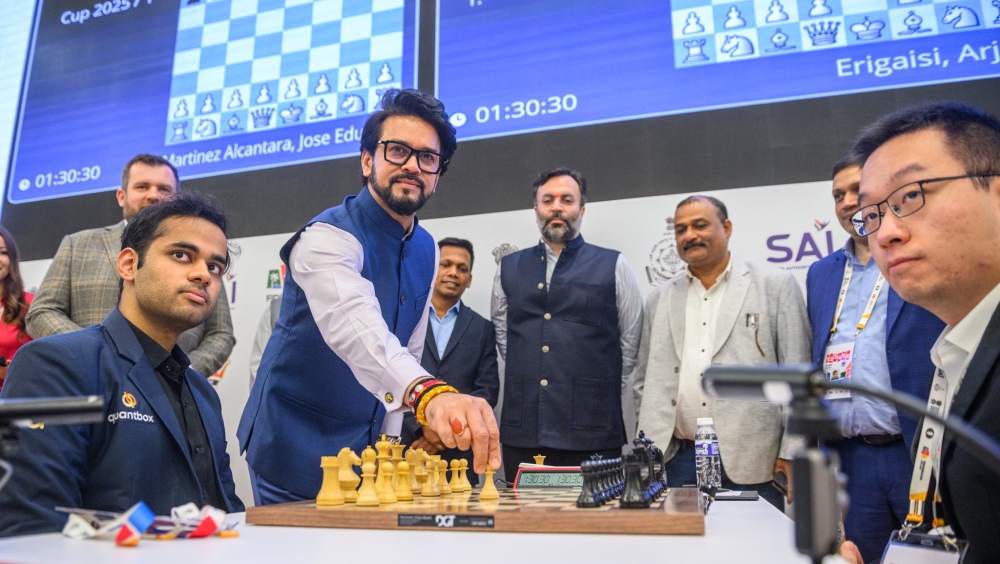
The tension was evident as players entered into the playing hall today, several arriving just minutes before the clocks were started, a sure sign of the pressure mounting at this decisive stage of the World Cup. The air in the playing hall was quiet and concentrated, yet packed with spectators eager to witness the eight remaining players in action. With only four spots in the semifinals, chess fans were treated to a blend of high-stakes precision and tightly controlled risk. The outcome was draws across all boards, meaning tiebreaks in three of them, and GM Nodirbek Yakkuboev advancing as the first semi-finalist after his victory over Alexander Donchenko yesterday. Before play began, the ceremonial first move was made by Mr. Anurag Singh Thakur, former Sports Minister of India, Member of Parliament, and Chairman of the Parliamentary Standing Committee on Coal and Mines on Board 2, for Erigaisi vs. Wei Yi. Quarterfinals Game 2 results: José Eduardo Martínez Alcántara ½-½ Javokhir Sindarov Arjun Erigaisi ½-½ Wei Yi Andrey Esipenko ½-½ Sam Shankland Alexander Donchenko ½-½ Nodirbek Yakubboev With the semifinal lineup still very much undecided, here’s a closer look at how each game unfolded today. Nodirbek Yakkuboev (2689) vs Alexander Donchenko (2641) Alexander Donchenko had a great deal at stake today. After fighting hard to survive the Round 5 tiebreaks, his classical loss yesterday left him in a must-win situation. He certainly tried, pushing until the very end, creating an imbalanced structure that forced Yakubboev to stay alert. The game followed the Exchange Variation of the Queen’s Gambit Declined, and Donchenko appeared well-prepared, gaining a 30-minute time advantage early on. However, despite his confident opening, his pace slowed and a series of imprecise choices led to a position where his winning chances faded. Black has just played the thematic 21…Bb1, aiming for a Ba2–c4 maneuver. While White has no obvious plan here, Donchenko chose one of the weakest options with 22.f3?, a move our commentators called “strange” as it gave Black easy counterplay. Yakkuboev responded with 22…f5 and followed through with his intended bishop maneuver, fully seizing the initiative. The critical moment came soon: White’s pieces were poorly coordinated, and the pawns on the third rank were vulnerable. Here, the powerful 26…Re8 could have posed major problems for White, especially with the threat of …Nb5 looming. If White tries passive defense with 27.Re1 Black builds up pressure with 27…Rb5 28.Rc2 Rb3. For instance, the natural-looking 29.Ng2 to guard the e-pawn is met by 29…Bd3 30.Rf2 (or 30.Rc3, also losing) 30…Bxb1 31.Rxb1 Nc4, leaving Black in full control. Instead, Yakkuboev started with 26…Rb5, allowing 27.Rg2. Though Donchenko escaped immediate danger, Black still held a comfortable edge. After further exchanges, the game entered a tense endgame where White appeared to retain some chances. However, Yakkuboev maintained accuracy and steered the game to a dead-even draw. With this result, he became the first player to qualify for the semifinals of the 2025 World Cup. Wei Yi (2752) vs Arjun Erigaisi (2773)As the only remaining Indian player in the field, Grandmaster Arjun Erigaisi carries significant expectations. Yet he has remained composed throughout the event, arriving calm at the board each day and greeting enthusiastic fans waiting (and chanting his name) outside. After a quick draw yesterday, today’s strategy was different – with the White pieces, Arjun prepared a fresh idea in the Queen’s Gambit Declined. Wei Yi, however, played confidently and quickly as well. The game soon left known theory and entered territory in which both players could just play chess. Tension started when Wei Yi chose to complicate with 18…c5, accepting an isolated queen’s pawn but gaining activity. The position suddenly became sharp: Arjun played the quiet-looking 20.Qe2 instead of the more natural 20.Qb1. Commentators GMs Jan Gustafsson and Peter Leko praised it as “strong and unexpected,” as it unpins the queen while provocatively placing it opposite Black’s rook and hinting at Na4 ideas. It posed psychological pressure. Wei Yi spent over 30 minutes here, visibly unsettled and shifting in his chair, before deciding on 20…Qc6. After 21.Nd2, however, Black 21…Nd7? (21…Nh5 was the better choice – we will get into that mess later, so bear with me if you want to get into deep analysis) allowing a tactical sequence: 22.Nb3 Bxc3 23.bxc3 Rxc3 Here Arjun had a golden opportunity – 24.Bxd5! and after 24…Qc8 25.Rxc3 Qxc3 White simply captures a free pawn with 26.Bxb7. Black also can choose 24…Qxd5 – and here is why the earlier mistake of 21…Nd7 matters. 25.Rxc3 Ng5 26.e4 (only move to keep the advantage and stop …Nf3), 26…Rxe4 27.Rd1! And the d7-knight is ill-placed and hanging. Instead, Erigaisi played 24.Qd2? and after 24…Rxc1 25.Rxc1 Qa6 26.Bxd5 Nf6! Wei Yi equalized and the game was drawn on move 32. Now let’s go back to the better 21…Nh5 which makes the difference. Now 22.Nb3 Bxc3 23.bxc3 Rxc3 24.Bxd5 does not hold the same venom after 24…Qxd5 25.Rxc3 Ng5 26.e4 Rxe4 and Black’s pieces, particularly the knights, are very active. The same idea we saw in the previous line of 27.Rd1 is a big blunder because of the desperado 27…Qxb3! And suddenly Black would be winning. This tactic would not be the same with the knight on d7. All of this analysis just goes to show how small nuances of a position can affect the evaluation but only surface moves later, and it’s curious to know whether all of this was seen. After intense days like these, we don’t corner the players for interviews, but after tomorrow I will definitely find out from the match’s victor how much was calculated here. Javokhir Sindarov (2721) vs José Eduardo Martínez Alcántara (2644)The draw between Sindarov and Martínez was the most curious result of the day, not for the score, but for how swiftly it was achieved. The players entered a known drawing line in the Four Knights Spanish and followed the theory to a peaceful result in just 20 minutes. For Martínez, who had the White pieces and momentum from previous rounds, it
Flamenco, speeches, and chess: Linares hosts 2025 FIDE Women’s Team Championship
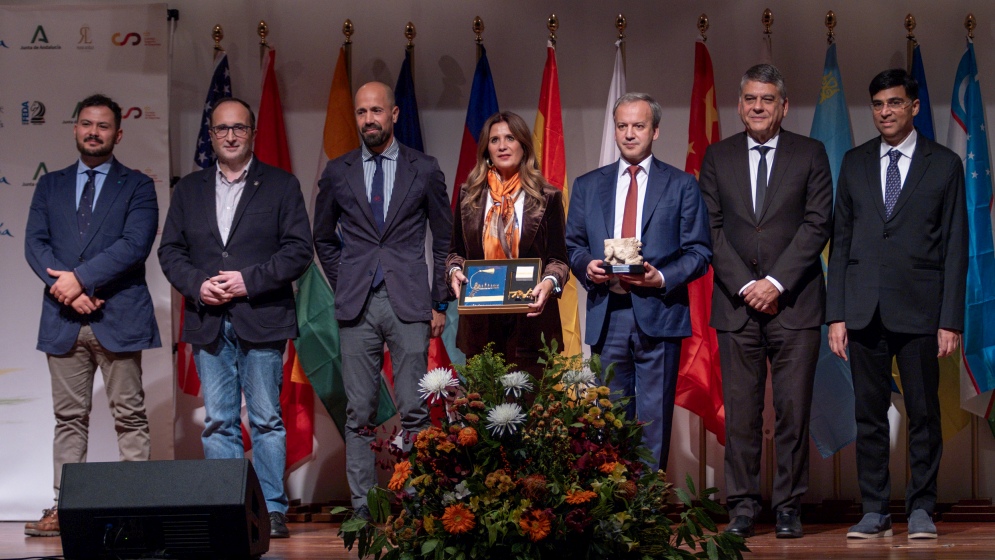
El Pósito, a fully restored 18th-century building, now serves as an exhibition space where visitors can explore the essence of Linares, in the province of Jaén (Spain). The center brings together the city’s history and cultural heritage, giving special prominence to mining and the art of flamenco. It was therefore fitting to enjoy a vibrant performance of Spanish flamenco, which delighted an audience of over two hundred players, officials, and guests, interwoven with inspiring speeches from dignitaries and chess leaders. Olivia Aranda, presenter of the opening ceremony, welcomed everyone promptly at 7 p.m., noting that Linares, with its rich history and heritage, provides the perfect setting for the 2025 FIDE World Women’s Team Chess Championship. After the audience stood for the Spanish and FIDE anthems and enjoyed a promotional video about Linares, they were treated to a spectacular fifteen-minute flamenco performance featuring José Manuel Cuenca on piano, Nazareth Romero singing, and Rosa González dancing. Immediately afterward, Auxi del Olmo Ruiz, the Mayor of Linares, took the floor. In an inspiring three-minute speech, she greeted the authorities, players, and guests, reminding everyone of the city’s deep chess history – a tradition that began in 1978 with the first Linares Tournament. She also highlighted that last year the Ibero-American Championship, along with several other Spanish national championships, was held in the city. In addition, she announced that Linares and the Spanish Chess Federation had signed a three-year sponsorship agreement to host numerous events. Next, Javier Ochoa de Echagüen, President of the Spanish Chess Federation, and Gorka Lerchundi Rebollo, Director General of Events and Sports Facilities for the Regional Government of Andalusia, gave uplifting speeches, emphasizing the city’s strong commitment to chess. Arkady Dvorkovich, President of the International Chess Federation, then took the stage. He impressed everyone with his excellent command of Spanish during a two-minute speech, expressing his gratitude to the Government of Andalusia and the city of Linares for hosting the tournament in a city with such a remarkable chess tradition. In a moment of great tenderness, Dvorkovich shared that it was his first visit to Linares, but that his father had visited the city many times, serving the Linares Tournament in various capacities, leaving him with fond memories. He concluded by officially opening the championship. Following the speeches, the ceremony continued with the drawing of lots to determine the pairings for each round. Viswanathan Anand, Deputy President of the International Chess Federation, and Jesús Mena Sarasola, Chief Arbiter of the championship, invited the team captains onto the stage. Anand greeted the audience and fondly recalled his first visit to Linares thirty-five years ago, sharing how meaningful it was to return. By selecting a bottle of olive oil numbered from one to six, each captain determined the starting number for their team in their respective pool, and the ceremony concluded with a group photo of each pool. With the drawing of lots complete, the Mayor of Linares and the FIDE President returned to the stage to exchange gifts, followed by a final group photo with all authorities. To close the ceremony, Olivia Aranda thanked everyone for attending, expressed her hope that the championship would run smoothly, and wished the chess players the best of luck. Round 1 begins on November 18 at 1:30 PM local time. The action can be followed live on the FIDE YouTube Channel, featuring expert commentary by GMs Antoaneta Stefanova and Ivan Cheparinov. Official website: worldwomenteams2025.fide.com/ Written by IM Michael (Linares, España) Photos: Raúl Martínez
FIDE World Cup: Tight starts in quarterfinals as only Yakubboev strikes
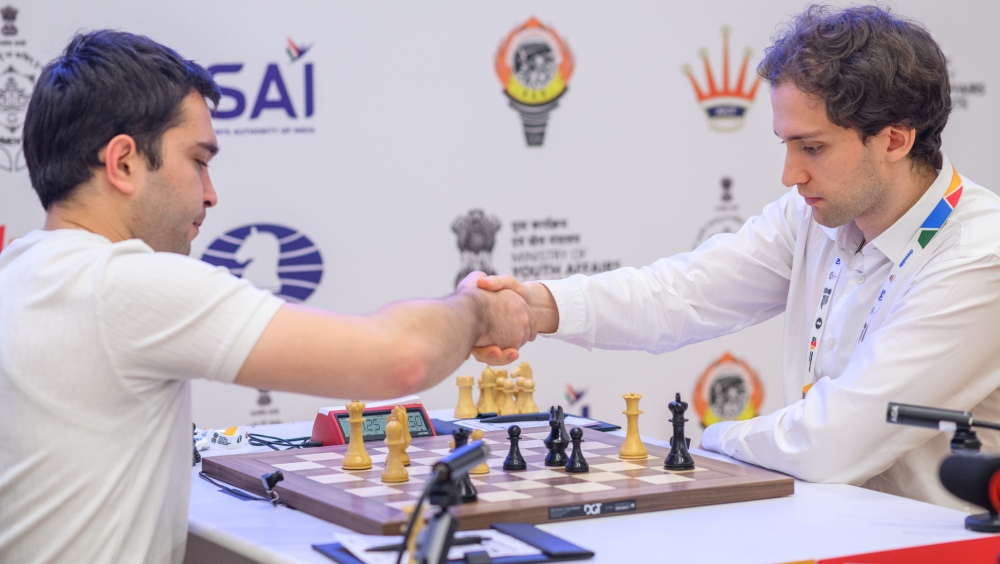
The quarterfinals have arrived at the FIDE World Cup 2025 in Goa, and the stakes could not be higher. Eight players remain, none of whom have qualified for the FIDE Candidates before. The field is a mix of seasoned super grandmasters and inspired underdogs, all of whom have battled tiebreaks on their journey here. Today, with no easy matchups and everyone hungry for a breakthrough, the questions were simple: Who would strike first? Who would hold their nerve? Some players opted for safety from the start: Wei Yi vs Arjun Erigaisi saw lightning-fast preparation and 99% accuracy from both sides, ending in a draw within an hour. Whereas Nodirbek Yakubboev vs Alexander Donchenko saw a chaotic game, and the only decisive one of the day. The atmosphere was calm but charged. The ceremonial first moves, 1.Nf3 d5, were played on Board 2 (Wei Yi vs. Arjun Erigaisi) by Shri Alok Kumar, IPS, Director-General of Police of Goa, and Gourav Rakshit, Global Chess League Commissioner. Quarterfinals Game 1 results: Javokhir Sindarov ½–½ José Eduardo Martínez Alcántara Wei Yi ½–½ Arjun Erigaisi Sam Shankland ½–½ Andrey Esipenko Nodirbek Yakubboev 1–0 Alexander Donchenko Nodirbek Yakkuboev (2689) vs Alexander Donchenko (2641) According to GM Peter Leko, this was “the game of the day,” and indeed, it could have gone in multiple directions. Nodirbek Yakubboev entered the round fresh, having not dropped a single game, but without facing a player rated above 2650. Alexander Donchenko, on the other hand, the lowest seed remaining, has been fighting giants all event, eliminating Candidates-qualifiers Anish Giri (2769) and Matthias Blübaum (2680), and surviving a nerve-wracking tiebreak against Lê Quang Liêm (2729). When asked about his choice to play the Alekhine Anti-Grünfeld setup (1.d4 Nf6 2.c4 g6 3.f3), Yakubboev said he wanted a “complicated but solid central structure.” Early on, Donchenko overoressed instead of completing development. In this early position, the safe retreat 11…Ng7 would have been best, but Donchenko went for the aggressive 11…Qh4? Black prevented White from castling but at unacceptably high price. White’s king found a safe heaven on c2, while Black’s pieces were awkwardly misplaced. Things went from bad to worse for Doncheko as he had no active plan, while Yakubboev gradually improved his position and secured the decisive advantage by move 20. The final blow occurred right after the time control. White finished off nicely with 42.Qb8+ Re8 43.Rg8+ Kxg8 44.Qxe8+ and Black resigned. In the post-game interview, Yakubboev exuded confidence, not just about qualifying for the Candidates but going all the way to win the World Cup. Tomorrow he has the black pieces and will need only a draw against the German Grandmaster to seal his spot in the semi-finals. On paper, this task seems simple enough, but the stress brought on by the World Cup can drastically alter that at any point. https://www.youtube.com/watch?v=tCIutOPMjWQ Javokhir Sindarov (2721) vs José Eduardo Martínez Alcántara (2644) Jose Martinez has had an incredible World Cup run, eliminating multiple top players in his wake – Nodirbek Abdussatorov (2750), Alexey Sarana (2675), and most recently, Pentala Harikrishna (2690). His momentum has been fueled by confidence, incredible preparation, and belief that his current strength is much more than his rating suggests. I think few players in the field could match this ambition as much as his opponent today – Javokhir Sindarov, the 19-year-old Uzbek star who earned his title at the mere age of 12, and is just a handful of points away from becoming Uzbekistan’s number one – overtaking Nodirbek Abdussatorov. A difference between the two, which could influence their approach to the classical segment, is their view of the faster time controls. Martinez thrives in the adrenaline of fast-paced chess, having even recently won Chess.com’s first edition of 3+0 Thursdays. Sindarov, on the other hand, had stated in his first interview with me that blitz is not his “type of chess”. Their first encounter featured a Queen’s Gambit Accepted line that has historically favoured White. Both players appeared to be well versed until Sindarov, playing with the white pieces, offered an early queen trade, which got Jose thinking – a rare occurrence for the Peruvian-Mexican grandmaster in the opening stage. Perhaps a sign of leaving his preparation and knowledge of the position. Despite the queenless middlegame, there was still a lot of play for both sides. Martinez, who at some point seemed more passive with the black pieces, and all pieces tied to the 6th-8th ranks, finally managed to break through with some space and simplifications. The resulting endgame saw both sides with four pawns each, white two knights and black a knight and a bishop. Then, a critical moment arose, when Martinez, with less than two minutes on his clock played incorrectly, giving White a chance: Here, Black has just played 33…f5, leaving the h6-pawn hanging. Sindarov however opted for 34.Ne5 – a nice-looking move if there hadn’t been a free pawn to capture (albeit at the expense of a somewhat awkward knight trapped on the rim after 34.Nxh6 Bc8 35.g4 Kf8 36.b6 Kg7 37.g5). A few moves later, the game was drawn. Wei Yi (2752) vs Arjun Erigaisi (2773) The heavyweight clash of the round featured two of the tournament favorites, both world-class talents with an eye on qualification. The downside: only one will progress. Both players arrived early at the board and looked relaxed. Their game followed a solid line of Closed Ruy López. Erigaisi, playing Black, blitzed out every single move and finished the entire game with more time on his clock than when he started – clear evidence of deep preparation. Both players showed perfect control: 99% accuracy, zero mistakes or inaccuracies, and a draw by repetition on move 31. A quiet start, but as the commentators noted, this match has all the ingredients for a fierce fight in Game 2. Sam Shankland (2654) vs Andrey Esipenko (2693) Between them, these players have appeared in ten World Cups. Both had their best runs in 2021: Shankland reached the quarterfinals before losing to

